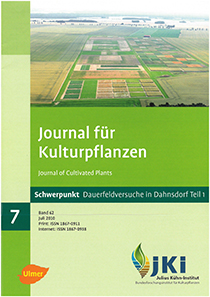Investigations of the energy efficiency of integrated and organic farming in a long-term field trial on a loamy sand soil
DOI:
https://doi.org/10.5073/JfK.2010.07.04Keywords:
Energy balance, integrated pest management, energy input, fossil energy use, energy gain, long-term effectsAbstract
On average of the period investigated, fossil energy use was lower by more than one third in organic farming (OF) compared with integrated farming (IF). This is predominantly due to not applying mineral fertilisers in OF while using in IF. The fossil energy consumption by using pesticides in IF was comparatively low. Moreover, due to smaller yield losses caused by weeds, diseases or pest infestation, energy efficiency was higher owing to pesticide use. Energy gain was significantly higher in the treatment with situation-related pesticide use (100% HF) compared with OF, whilst differences were greater in winter wheat cropping compared to winter rye cropping. Accordingly, winter rye is regarded to be an appropriate crop for organic farming systems under comparable climatic and site conditions.
Energy intensity as well as output/input ratio were predominantly better in OF compared with IF, while significant differences were particularly found in winter rye cropping. In order to meaningfully assess complex cropping systems with respect to their energy efficiency, hence, all three energy balance indicators mentioned should be regarded. Furthermore, the results presented in this paper indicate that investigations on the energy efficiency of different cropping systems should only be proceeded on the level of the crop rotation by taking into account long-term effects of different husbandry. The given results show, moreover, that a balanced crop rotation and crops or varieties being well-adapted to the given site-conditions, are of utmost importance in regard to the yield potential or the energy balance of the respective cropping system.
Downloads
Published
Issue
Section
License
The content of the journal is licensed under the Creative Commons Attribution 4.0 License. Any user is free to share and adapt (remix, transform, build upon) the content as long as the original publication is attributed (authors, title, year, journal, issue, pages).
The copyright of the published work remains with the authors. The authors grant the Journal of Cultivated Plants, the Julius Kühn-Institut and the OpenAgrar repository the non-exclusive right to distribute and exploit the work.







